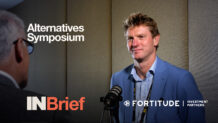Russia, Ukraine and the challenge of transparency
Low-cost or “passive” investing has been touted as the biggest innovation in finance for the last several decades. The idea is simple, mastered by the likes of BlackRock and Vanguard: to replicate a major index, like the S&P500 or S&P/ASX200, and offer this to investors in a simple investment vehicle at the lowest cost possible.
This has two benefits to financial advisers, asset managers and individual investors alike. The first is the ability to gain a highly diversified exposure to nearly any market in the world. The second is the fact that investing into a passive, index-tracking fund or exchange-traded fund (ETF) means you never have to explain underperformance to a client, or yourself.
Yet this outsourcing to passive investment strategies may breed complacency in the due diligence process. How much attention are we paying to the underlying investments that make up the benchmarks these products are tracking? For instance, are we comfortable that something like the S&P500 or S&P/ASX200 is increasingly dominated and driven by an ever-smaller cohort of companies?
ETFs are somewhat rare in that they must report every single underlying investment down to the dollar to shareholders, as opposed to most active managers or pension funds, which offer either delayed portfolio holdings or only offer insight into the largest exposures.
This issue has come to a head in the recent invasion of Ukraine, whereupon many unwitting investors realised they had an exposure to Russian companies of which they were unaware. Most indices tracking Emerging Markets will have a material exposure to Russian equites; in fact many value-focused active managers had outright positions in some of Russia’s biggest banks.
It took several days for the largest pension funds to feel the pressure of the federal government to divest their exposures, while most index providers have cut Russia from these benchmarks. But this has come after the Russian sharemarket and many companies within it fell between 50 and 70 per cent in just a few days. In many cases, it may well have been the case that many of these groups simply didn’t know what exposure they had.
A similar issue arose late in 2021 when the impending collapse of Chinese property developer Evergrande was made public. As the largest developer in the country, the bonds issued by the group were a large part of the market and thus represented a material allocation within the global high-yield bond index and related ETFs.
Naturally in this fast-moving world we all tend to look at the cheapest and most efficient option first, but this is another reason why we need to understand what we are recommending more than ever. Due diligence is becoming more rather than less important in this environment.











